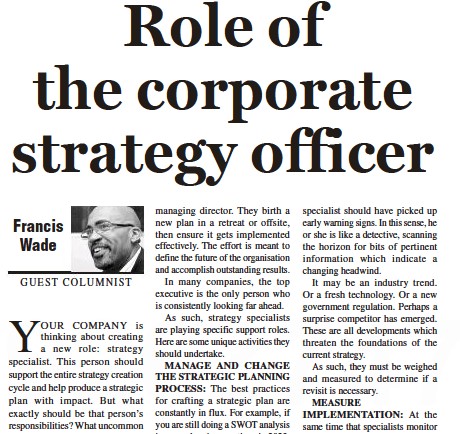Your company is thinking about creating a new role: strategy specialist. This person should support the entire strategy creation cycle and help produce a strategic plan with impact. But what exactly should be that person’s responsibilities? What uncommon value should they add?
The challenge of filling this position is unique. Why? Strategy is the main job of the CEO or MD. They birth a new plan in a retreat or offsite, then ensure it gets implemented effectively. The effort is meant to define the future of the organization and accomplish outstanding results.
In many companies, the top executive is the only person who is consistently looking far ahead.
As such, strategy specialists are playing specific support roles. Here are some unique activities they should undertake.
- Manage and Change the Strategic Planning Process
The best practices for crafting a strategic plan are constantly in flux. For example, if you are still doing a SWOT analysis in your planning meetings in 2023, it’s a sign of outdated thinking.
The most qualified person to manage and update the strategic planning process in your company could be the strategy specialist. They can do the research needed to uncover improvements and test fresh technology. This keeps the process running efficiently, engaging participants along the way.
The truth is, it’s quite hard to create a great strategic plan with a bad process. Some may think it’s a matter of personality, but I differ. While a “strong” leader can make a difference, this is a group effort.
A strategy specialist recognizes this fact and knows that a top quality plan needs a wide range of employees to implement them. What holds them together is a well-defined process and skilled facilitation.
- Craft a Special Role During Implementation
When the planning cycle is over and implementation has begun, a strategy specialist needs to be wary of picking up the role of de facto project manager of “strategic initiatives.”
Instead, leave that role to the Project or Programme Management Office – PMO. This is, after all, their area of expertise. Alternately, focus on feeding the executive team with critical updates from outside. Here’s why it’s important.
Once a strategic plan has been completed, it’s not like adding another unit to a 1,000 home housing scheme. A carbon copy. Instead, it represents a compilation of brand new thinking.
As such, each strategic plan is built with a number of untested hypotheses, which themselves rest on a foundation of assumptions.
No-one can know for sure whether the hypotheses and assumptions are correct. But the strategy specialist must track whether they hold up as life unfolds.
In other words, long before an executive detects that there’s a huge threat to the current strategy, the specialist should have picked up early warning signs. In this sense, he/she is like a detective, scanning the horizon for bits of pertinent information which indicate a changing headwind.
It may be an industry trend. Or a fresh technology. Or a new government regulation. Perhaps a surprise competitor has emerged. These are all developments which threaten the foundations of the current strategy.
As such, they must be weighed and measured to determine if a revisit is necessary.
- Measure Implementation
At the same time specialists monitor the external world, they should ensure that the plan is taking root in the organization.
Most companies have past horror stories about strategic plans which were crafted, and sounded good on paper, but never reached implementation.
There are a number of pitfalls which can occur. Some have to do with a lack of accountability. There are difficult, feedback conversations which just don’t take place.
Part of the reason lies with a manager’s missing skills. But he/she also lacks data.
I recommend you use the Balanced Scorecard to measure how well your strategic plan is being implemented. It can also be used to test the assumptions and hypotheses within the plan.
In both cases, the company’s leaders can see at a glance whether implementation is actually taking place. But are they required to watch the numbers this closely?
Absolutely. Every single strategic plan is intended to move the needle in an organization. This change occurs at the expense of prior habits and priorities. The battle to make these changes is real.
The specialist ensures that this progress is being made. They also raise a flag when not enough is happening to ensure success.
In summary, the strategy specialist role is an unusual one that most organizations have not identified clearly. However, every serious organization must perform these functions. Even if they are all conducted by the CEO, they should never be allowed to fall through the cracks.

